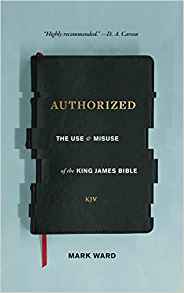
Mark Ward
Reviewed by: Calvin R. Goligher
Authorized: The Use and Misuse of the King James Bible, by Mark Ward. Lexham, 2018. Paperback, 168 pages, $10.39 (Amazon). Reviewed by OP pastor Calvin R. Goligher.
Mark Ward’s book on the use and misuse of the King James Bible is the most fun you will ever have reading about Bible translations. More importantly, though, Ward’s book persuasively and charitably presses an important argument: that, in our present context, the King James Bible is no longer a vernacular translation, and therefore churches ought not to use it as their primary Bible translation. It is not that Ward despises the King James Bible. He grew up with it, and he recognizes the benefits of its prominence in the English-speaking world. Ward insists that, those advantages notwithstanding, the Bible ought to be translated into the common language of the common people. The Bible, especially Paul in 1 Corinthians 14, the Protestant Reformers, and the translators of the King James Bible themselves shared this conviction. His point is that, owing to the enormous changes in the English language over four centuries, the King James Bible no longer fulfills this ambition.
Ward provides many detailed examples of how the King James Bible falls short of a vernacular translation. The most important issue is what he calls “false friends.” These are “words that are still in common use but have changed meaning in ways that modern readers are highly unlikely to recognize” (31). We need to look these words up, too, but—and this is the crucial point—we will not usually know that we need to look them up. To mention just one example: how should we obey Paul’s instruction in Romans 12:7 to “wait on our ministering”? A modern English speaker might assume that Paul wants us to “pause before starting to serve.” In fact, Paul wants us to “carefully attend to our serving,” which is exactly the meaning of the phrase “wait on” that was current when the King James Bible was first published (40).
Ward does an especially good job of interacting charitably and frankly with proponents of the King James Version. He thoughtfully responds to their concerns about reverence, the deterioration of language, the usefulness of singular (“thee”) and plural (“you”) pronouns, the transparency of italicizing words supplied in English, and other matters. The practical takeaway that Ward wants to leave with his readers is simple: feel free to continue using the King James Bible, but also use multiple vernacular translations. We have God’s words in our own language, and this privilege brings the responsibility to read “those words in translations [we] can understand” (118). Even if we continue to prefer the King James Bible for our personal use, we must ensure that our ministry of God’s Word to others is intelligible, and therefore edifying. We must help others approach God’s Word, and not put unnecessary obstacles in their way (120).
July 07, 2024
June 30, 2024
Digital Liturgies: Rediscovering Christian Wisdom in an Online Age
June 23, 2024
Worthy: Living in Light of the Gospel
June 16, 2024
The Shepherd’s Toolbox: Advancing Your Church’s Shepherding Ministry
June 09, 2024
The Unfolding Word: The Story of the Bible from Creation to New Creation
June 02, 2024
The Most Unlikely Missionaries: Serving God’s Kingdom in the Middle Kingdom
May 26, 2024
© 2024 The Orthodox Presbyterian Church